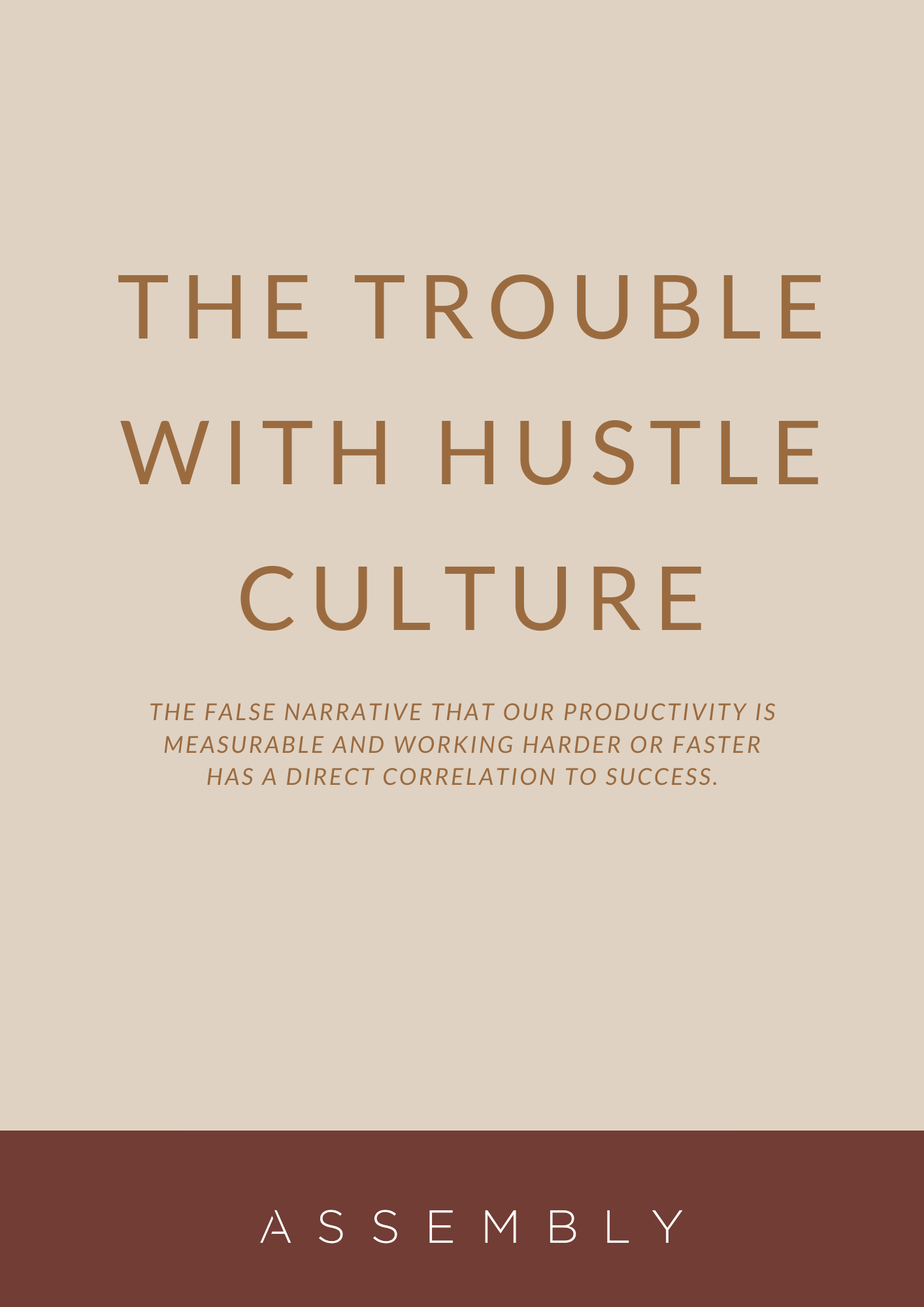THE TROUBLE WITH HUSTLE CULTURE
I want to address Hustle Culture today because this is something that I’ve become increasingly aware of in online coaching spaces.
The idea that our productivity is measurable.
Or that if you work harder and faster and more that somehow your value increases.
It’s the message that if we just keep pushing through hard stuff, we’ll be met with success on the other side. It’s the quotes on Instagram that encourage us to ‘rise and grind’ or ‘Don’t stop when you’re tired, stop when you’re done’.
The reality is that lessons on the dangers of hustle culture and quotes like these are often learned by burnout. This message, which is often found in the entrepreurial world, dominated by masculine voices, lacks so much nuance, context and real life grounding.
We are sweeping these pressurised ideas of what it means to achieve success or go after our dreams over the lives of real people with a huge spectrum of differing responsibilities, of access, of mental health needs, of time constraints, of financial obstacles, of physical abilities. And when we hold this culture up as the one that is the pinnacle, and fob all of that contextual stuff off as ‘excuses’ then the damage is absolutely real.
It leaves people questioning their worth, the value of what they have to offer, their ability to do things, their competency and it quashes their passion, their desires and their motivation. Hustle culture has a temporary dopamine hit of motivation, but it’s not a sustainable way to work and it’s a toxic message to peddle.
So today I want to talk through four ways that I see hustle culture seeping into how we are expected to work today, why it’s a troubling message and what the alternative is.
The problems with hustle culture and what the alternatives are
The first thing I want to raise about hustle culture is the idea that if you are someone who is building a business, a community or creating something to put out there and offer.
1) Feeling like you need to always be on and available.
Hustle culture is not really interested in boundaries. It talks a lot about how you can’t miss opportunities, you have to seize them no matter what and offer the very best, most responsive output to your clients, customers or community.
This idea that human beings have the capacity to always be responsive to the needs of their business is dangerous and is a quick way to send your nervous system into high alert which is a really harmful state for our bodies to be in consistently.
We are not bots, we are humans. We do not owe our IG followers or inboxes quick responses. To think that we need to reply to every single question, response or request that comes our way lest we miss something is scarcity mentality dressed up as being attentive to our community.
This scarcity mentality is rife in hustle culture, but it’s often disguised as not letting opportunities go by. But behind this is the reality that often we believe that if we don’t make ourselves available at all times, if we don’t respond to every single DM, if we don’t reply to every question from potential customers or clients then they will go away and there’ll be less for us.
That’s simply not true.
They may go elsewhere but it doesn’t mean there’s less for you. I don’t know about you but I want to build a business where my clients know, appreciate and respect my boundaries about my availability to respond to them. I want them to see me as human, with complex and widespread responsibilities outside of my work. A lot of my own work around this has been about trusting that my work stands up, even when I step away from it or take breaks. It’s been about trusting that the value I have to offer isn’t connected to how available I am to be all things to all people. I wonder what shifting around you might need to do in your head or in practice to reroute the idea that you shouldn’t be expected to be on and available in your business all of the time.
2) Using guilt or shame to attract customers
The next message of hustle culture that I want to address is the practice of using guilt and shame to attract customers or clients. No no no no no.
I have seen this SO much in the online business world – the language that is put out through copy, sales pages, Instagram etc is all about focusing on the dissatisfaction and pain of the potential customer or client. It’s a technique that works, for sure. I’m not saying it doesn’t work. But using tactics to rush people into buying from you or alluding that there is something wrong with them in order to sell your stuff is manipulative at best and ethically wrong at worst and isn’t actually creating a culture of business honesty and integrity.
This kind of marketing preys on peoples vulnerabilities as a quick way to get conversions and close the sale. Again, it treats people like commodities to accumulate from. It’s scarcity driven, not authenticity driven. This type of communication comes in all different forms but usually it’s packaged up with some sort of urgent but arbitrary time frames and pricing. It also plays on language that would have you believe that without this thing, you’ll be less than, stuck, or left out.
What we need is more business owners communicating about your business from a place of trust and honesty, highlighting the value of what they do, speaking to what their product or service offers and allowing people space to make up their minds, rather than hustling people into things as a statement connected to their struggle.
3) Assigning worth or value to your output
There is definitely something satisfying about giving your best to a project or idea, right? That is a great feeling. Knowing that you’ve committed yourself to something and seen it through and are really proud of your work. But with hustle culture looming around us we have to be careful that we aren’t conflating working hard with hustle.
Because in hustle culture, it’s more about showing that you’re working hard, glorifying your output and your ability to grind more than it is about the quality of your work and your dedication to doing a good job and preserving your capacity limits. It’s Instagram posts about how busy you are, more as a humble brag nod to how much you work. It’s a reinforcement of the idea that if you’re not struggling, you’re probably not working hard enough. Which we know is bullshit.
When we assign work or value on someone’s ability to push their mental and physical capacity to the limits or on how productive someone is, we are bending to the capitalism playbook that would have us think that the only thing that matters is accumulation and increasing the bottom line. We know that humans are made for more than just working. We were made for community, to experience pleasure, to enjoy rest, for curiosity and innovation. Not to grind away as a badge of honour to the detriment of all of those things.
For those of us who have grown up with messages about our productivity being a measure of our worthiness, it takes a great deal of unpicking. It’s hard for our systems to go from filling up empty space with stuff to do, always improving or striving for something to relaxing into the margins and being at peace with our efforts in the different seasons of life.
It takes some practicing being able to slow things down, being OK with not always doing, setting limitations to our work days and what we do. Hustle culture creates an addiction to doing and elevates it as the most important part of the human experience. Reality is, if we love what we do and we want to have energy to sustain or even regenerate ourselves in our work, we have to practice knowing what is ‘enough’ for us to take on and do so we can be fully present, attentive and aligned with our work.
4) The fall narrative that hustle is a fast track to success
Another fall out of hustle culture is the idea that there is a fast track path or quick hack for growth or success. Hustle culture will try to whisper to you that there are insider ways that you can access the next level and you can do it with speed.
It’s important that we break down exactly what it is this message wants us to hustle towards? What is the end game of hustle culture and it’s promise of “success”? Is it to make loads of money? Is it to have thousands of followers? Is it to feel more freedom? Maybe it’s not even a consideration. Maybe the end goal isn’t even something clear but feels like a slippery slope we feel we should go down if we want to feel like what we’re doing is worth something.
“Once I crack 10k followers, everyone will take me seriously”
“Once I have sold out launches I’ll be known for what I do”
These illusions of fast tracks to growth or success, however you want to define it – are a fools errand. They are often laden with risky or unfounded business advice that have big promises but no real substance.
But the real fools errand quality is that it robs us of the joy (and pain) of being a beginner, a learner, of growing with your community, of trying things out on your own terms, of factoring in your own very nuanced life, of building steady foundations to your business that feel honest to you and reflect what you want to build.
We have forgotten that there’s nothing to win here. No one is going to be crowned fastest business winner of all time. It’s not even that the goalposts will keep moving, it’s that the goalposts don’t even exist. They are a construct that keeps us feeling inadequate and competitive and have us convinced that we are always too far away from it.
There is no hack to growing your business. There is only you and your aligned, trustworthy way of showing up for your work, doing your best and letting people know how they can connect with it.
Ultimately, hustle culture leads us down the path of always having to prove ourselves. Prove that we’re good, we’re hard working, we’re worth paying attention to. Hustle culture sneaks up on those of us who are ambitious and believe we have something to offer that is valuable. What it robs us of though is the ability to be present and grateful for what we have, because it will always insist there’s more to gain.
Happiness becomes a threat to our sense of achievement because contentment has been sold to us by hustle culture as laziness.
Don’t fall for it my friends, take the longer, steadier more honest path.
Don’t give up on your ideas and your beautiful work. Honour it by putting scaffolding around it that will hold it up, that will offer you spaciousness to stay creative and in your integrity and know that I’m right along with you, trying to do the same.
I’m Mel, Courage Coach and Founder of the Assembly Community. I’m here to help you build courage by getting clear, trusting yourself and being visible with your work and ideas.





















